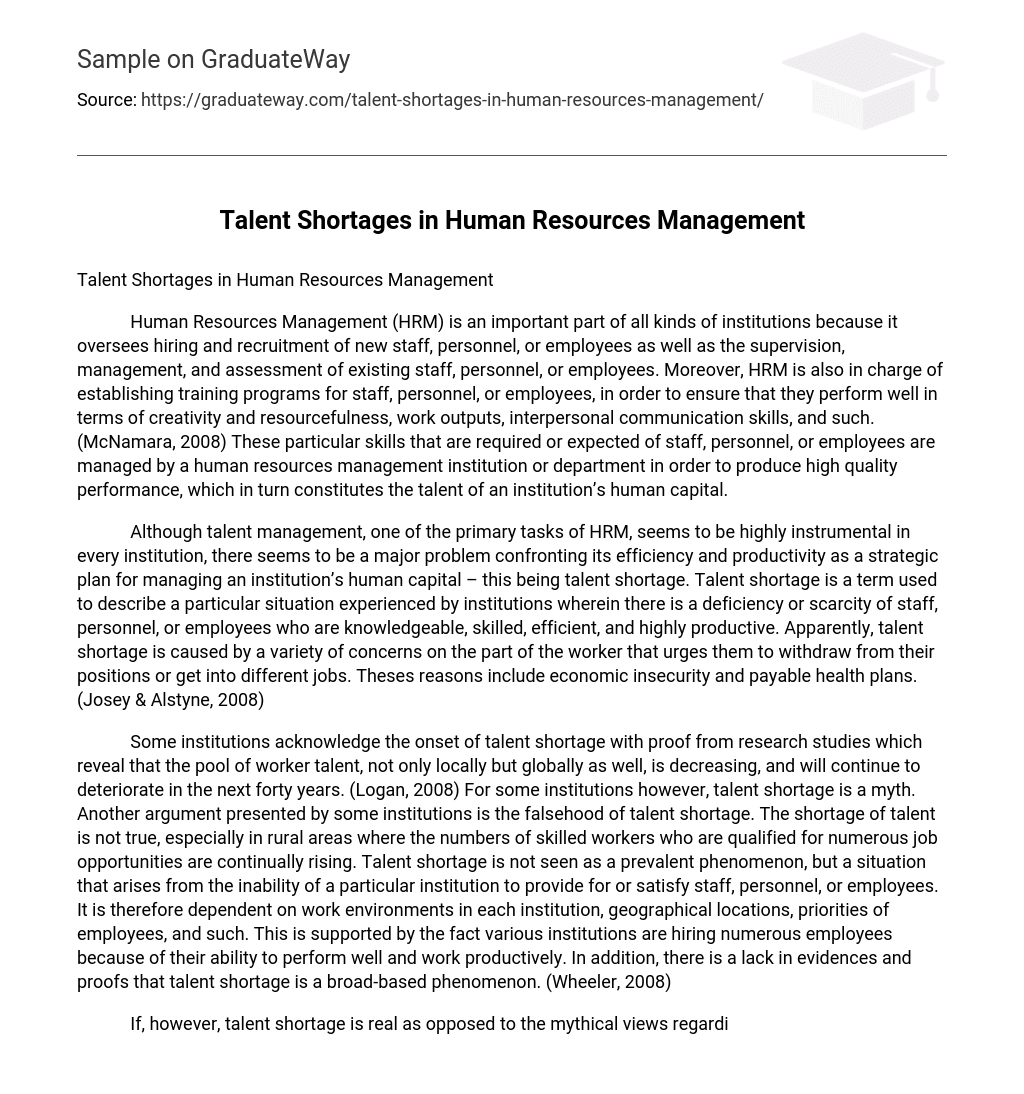Human Resources Management (HRM) is an important part of all kinds of institutions because it oversees hiring and recruitment of new staff, personnel, or employees as well as the supervision, management, and assessment of existing staff, personnel, or employees. Moreover, HRM is also in charge of establishing training programs for staff, personnel, or employees, in order to ensure that they perform well in terms of creativity and resourcefulness, work outputs, interpersonal communication skills, and such. (McNamara, 2008) These particular skills that are required or expected of staff, personnel, or employees are managed by a human resources management institution or department in order to produce high quality performance, which in turn constitutes the talent of an institution’s human capital.
Although talent management, one of the primary tasks of HRM, seems to be highly instrumental in every institution, there seems to be a major problem confronting its efficiency and productivity as a strategic plan for managing an institution’s human capital – this being talent shortage. Talent shortage is a term used to describe a particular situation experienced by institutions wherein there is a deficiency or scarcity of staff, personnel, or employees who are knowledgeable, skilled, efficient, and highly productive. Apparently, talent shortage is caused by a variety of concerns on the part of the worker that urges them to withdraw from their positions or get into different jobs. Theses reasons include economic insecurity and payable health plans. (Josey & Alstyne, 2008)
Some institutions acknowledge the onset of talent shortage with proof from research studies which reveal that the pool of worker talent, not only locally but globally as well, is decreasing, and will continue to deteriorate in the next forty years. (Logan, 2008) For some institutions however, talent shortage is a myth. Another argument presented by some institutions is the falsehood of talent shortage. The shortage of talent is not true, especially in rural areas where the numbers of skilled workers who are qualified for numerous job opportunities are continually rising. Talent shortage is not seen as a prevalent phenomenon, but a situation that arises from the inability of a particular institution to provide for or satisfy staff, personnel, or employees. It is therefore dependent on work environments in each institution, geographical locations, priorities of employees, and such. This is supported by the fact various institutions are hiring numerous employees because of their ability to perform well and work productively. In addition, there is a lack in evidences and proofs that talent shortage is a broad-based phenomenon. (Wheeler, 2008)
If, however, talent shortage is real as opposed to the mythical views regarding this phenomenon, it would greatly impact the financial and legal situations of institutions. Moreover, it will influence the productivity, morale, and other activities or programs related to HR. Talent shortage influences financial and legal decisions in such a way that it increases the costs provided by the institution and legal processes and practices are modified to accommodate the needs and demand of staff, employees, or personnel better. With the threat of talent shortages, institutions will exert effort in order to avoid highly skilled and productive staff, personnel or employees from withdrawing from their positions. The result would be to increase cost of spending in order to compensate staff, personnel, or employees in terms of increase in salary, benefits, leisure opportunities, and such. This goes the same for the modification of legal practices and principles.(Malik, 2008)
HR activities are also likely to change with the onset of talent shortage. Since the productivity and morale of staff, personnel, or employees, in such a way that they lose their motivation because of the pressure passed on to them by high expectations of quality work and productivity. On one hand, staff, personnel, or employees might become aggressive in requesting for rewards and benefits due to the value granted to them by the shortage in highly qualified human capital. This is where changes in HR activities come in, such that training programs are designed in order to motivate their employees and ensure that everyone is highly trained so as not to suffer much from the effects of talent shortage. Moreover, the HR department should ensure that it determines the most pressing needs, concerns, demands, and difficulties of staff, personnel, or employees, and design programs that will accommodate these issues (i.e. rewards programs, comprehensive training, desirable health care programs, and such). (Paton, 2008)
Resources
Josey, B. & Alstyne, S. V. (2008). Talent Shortage Emerges as No. 1 Employer Concern.
Retrieved October 21, 2008, from Deloitte Development LLC. Website: http://www.deloitte.com/dtt/press_release/0,1014,sid%253D2283%2526cid%253D197969,00.html
Logan, G. (2008). Global Leadership Talent Shortage Forecast. Retrieved October 21, 2008,
from Reed Business Information. Website: http://www.personneltoday.com/articles/2008/05/21/45938/global-leadership-talent-shortage-forecast.html
Malik, R. (2008). Talent Shortage Contribution to Inflation Spiral. Retrieved October 21, 2008,
from Bennett Coleman & Co. Ltd. Website: http://economictimes.indiatimes.com/Features/Corporate_Dossier/Talent_shortage_contributing_to_inflation_spiral/articleshow/3554159.cms
McNamara, C. (2008). Human Resources Management. Retrieved October 20, 2008, from
Authenticity Consulting, LLC. Website: http://www.managementhelp.org/hr_mgmnt/hr_mgmnt.htm
Paton, N. (2008). Talent Shortage tops HR’s List of Worries. Retrieved October 21, 2008, from
Management-Issues Ltd. Website: http://www.management-issues.com/2008/3/27/research/talent-shortage-tops-hrs-list-of-worries.asp
Wheeler, K. (2008). The Myth of Talent Shortage. Retrieved October 21, 2008, from ERE
Media, Inc. Website: http://www.ere.net/2008/07/31/the-myth-of-a-talent-shortage/





